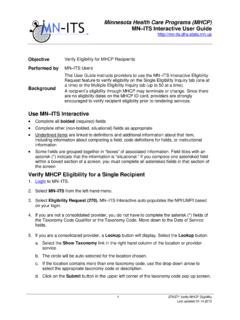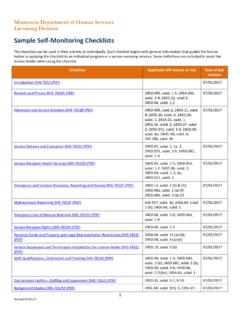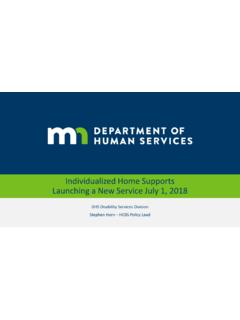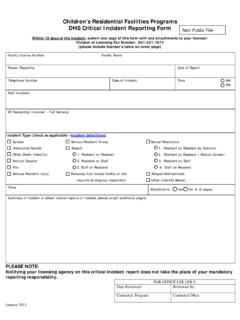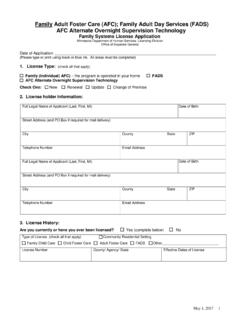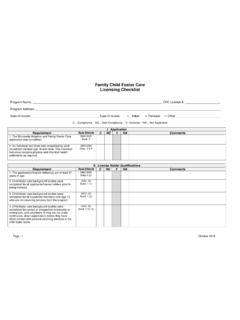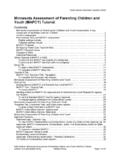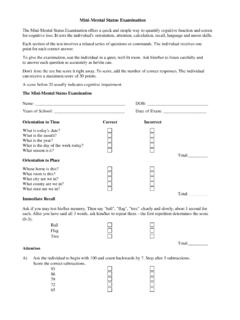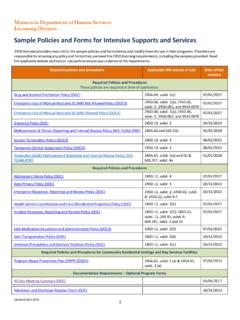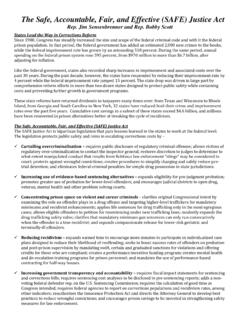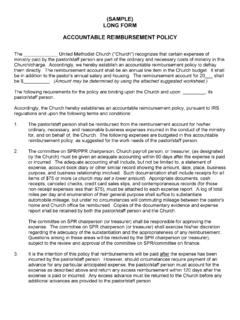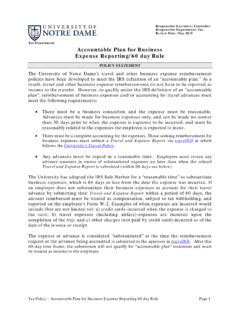Transcription of Accountable Communities for Health
1 Accountable Communities for Health PER SPEC T I V ES O N GRA N T PRO J EC T S A N D F UT U R E C O N SI DERA T I O N S October 2016 Minnesota Department of Health Health Care Homes Box 64882 St. Paul, MN 55164-0882 (651) 201-5421 A C C O U N T A B L E C O M M U N I TI E S F O R H E A L T H 2 Accountable Communities for Health Authors: Brian Awsumb, Chris Dobbe, Sida Ly-Xiong, Rosemarie Rodriguez-Hager, Diane Rydrych, Whitney Terrill Acknowledgements: Jennifer Blanchard, Bonnie LaPlante Prepared by: Minnesota Department of Health Health Care Homes Box 64882 St. Paul, MN 55164-0882 (651) 201-5421 This project is part of a $45 million State Innovation Model (SIM) cooperative agreement, awarded to the Minnesota Departments of Health and Human Services in 2013 by the Center for Medicare and Medicaid Innovation (CMMI) to help implement the Minnesota Accountable Health Model.
2 Upon request, this material will be made available in an alternative format such as large print, Braille or audio recording. Printed on recycled paper. A C C O U N T A B L E C O M M U N I TI E S F O R H E A L T H 3 Contents Summary .. 4 Overview of an ACH .. 6 Accountable Communities for Health at the Midpoint .. 12 Other ACH Approaches .. 28 Recommendations .. 32 Conclusion .. 41 References .. 42 A C C O U N T A B L E C O M M U N I TI E S F O R H E A L T H 4 Summary Accountable Communities for Health (ACH) expand the idea of team-based, integrated, coordinated care to transform Health care delivery, accountability and payment. In Minnesota, 15 unique ACH projects have worked to address local challenges across the State using community-based care coordination models.
3 ACHs drive Health reform efforts by supporting provider organizations in partnership with Communities to engage consumers, identify Health and cost goals and take on accountability for population Health . All ACH projects have contributed implementation lessons that may inform ongoing transformation of Minnesota s Health system. Minnesota is working to advance the Minnesota Accountable Health Model and expand active community participation with a broad range of stakeholders and providers in addressing local Health needs. The Minnesota Accountable Health Model is funded through a $45 million grant from the Center for Medicare and Medicaid Innovation (CMMI) as part of the State Innovation Model Initiative (SIM).
4 The goals of Minnesota s Accountable Health Model align with the Institute for Healthcare Improvement s Triple Aim which focuses on population Health , experience of care and per capita cost. The ACH projects are part of an ongoing effort to ensure that every Minnesotan has the option to receive team-based, coordinated, patient-centered care that increases and facilitates access to medical care, behavioral Health care, long term care and other services. A C C O U N T A B L E C O M M U N I T I E S F O R H E A L T H 5 Figure 1. Distribution of ACH Projects in Minnesota Source: State Health Access Data Assistance Center (SHADAC) (October 2015). Database: Organizations Participating in the Minnesota State Innovation Model (SIM) Initiative.
5 " University of Minnesota, School of Public Health . Minneapolis, Minnesota. A C C O U N T A B L E C O M M U N I TI E S F O R H E A L T H 6 Overview of an ACH The Accountable Communities for Health grant program is part of the Minnesota Accountable Health Model, funded by a State Innovation Model (SIM) testing grant of over $45 million from the Center for Medicare and Medicaid Innovation. Approximately $ million, or 14 percent, of Minnesota s SIM funds were invested in 15 community-led ACH projects to help providers and Communities work together and expand patient-centered, team-based care. Accountable Communities for Health meet clinical and social needs of a defined population through coordinated care across a range of providers: acute and primary care, behavioral Health , long term care, local public Health , social service and other community-based supports.
6 Through community engagement, ACH partnerships establish priorities for population Health outcomes and plan activities to coordinate care with Accountable Care Organizations (ACO) within their community. Foundations for Accountable Communities for Health Minnesota s 2008 bipartisan Health reform efforts established the Health Care Homes certification program. A Health care home is an approach to primary care in which primary care providers, families and patients work in partnership to improve Health outcomes and quality of life for individuals with chronic or complex Health conditions. They strive to place patients and families at the center of their care and to provide the right care at the right time and right place.
7 Health Care Home recertification standards encourage providers and clinics to take a proactive approach to planning and partnering with community resources to ensure their patients have access to needed resources and services. HCH certification is a voluntary program in which practices and providers, after meeting a rigorous set of certification standards, become eligible for receiving monthly per-person payments for care coordination activities. The practice standards of a certified Health Care Home clinic became an important foundation to transforming primary care delivery. Recognizing that a potential limitation of the Health Care Homes program was its focus on medical care, in 2011 MDH designed a community care team pilot to improve coordination between clinics, local public Health and community providers.
8 The pilot was tested in three Communities , Hennepin and Olmsted Counties and the Ely area. Grant funds were state-only dollars administered out of the Health Care Homes section. Each of the community care team pilot projects met their goals to learn how to implement a community care team that included community members and community providers, to identity care coordination methods in their Communities and to develop a sustainability plan with recommendations for the future. The important learnings from these pilots served as the foundation for the Accountable Communities for Health grant program. All three community care team pilots subsequently received SIM funds to extend their state-funded programs.
9 A C C O U N T A B L E C O M M U N I T I E S F O R H E A L T H 7 Community Care Team Pilots Early ACHs Essentia s Ely Clinic (Ely, MN) is a sole provider of primary care and specialty outpatient services for this rural community, Ely Clinic services residents in northeastern St. Louis and northwestern Lake Counties. Their CCT grant focused on leveraging integration of services to meet the needs of young adults and of adults aged 55 years and older. HCMC Community Care Team (CCT) serves one of the most diverse ethnic and cultural populations in Minnesota, approximately the service area for HCMC s Brooklyn Park and Brooklyn Center clinics.
10 The CCT goals and activities included families, patients and community members in northwest Hennepin County who were adults with Type 2 diabetes. Mayo Community Care Team served Olmsted County in southeastern Minnesota with a reach of approximately 124,000 people. The number of adults over age 65 is expected to increase by 117% from 2000 to 2030, nearly 1 in 5 living with at least one disability. This CCT focused on individuals at high risk for hospital or nursing home admission or use of emergency services. To establish its Accountable Communities for Health model, Minnesota also reviewed literature, policy recommendations and the early work of community care teams in Vermont and North Carolina that had integrated Health and social services.
